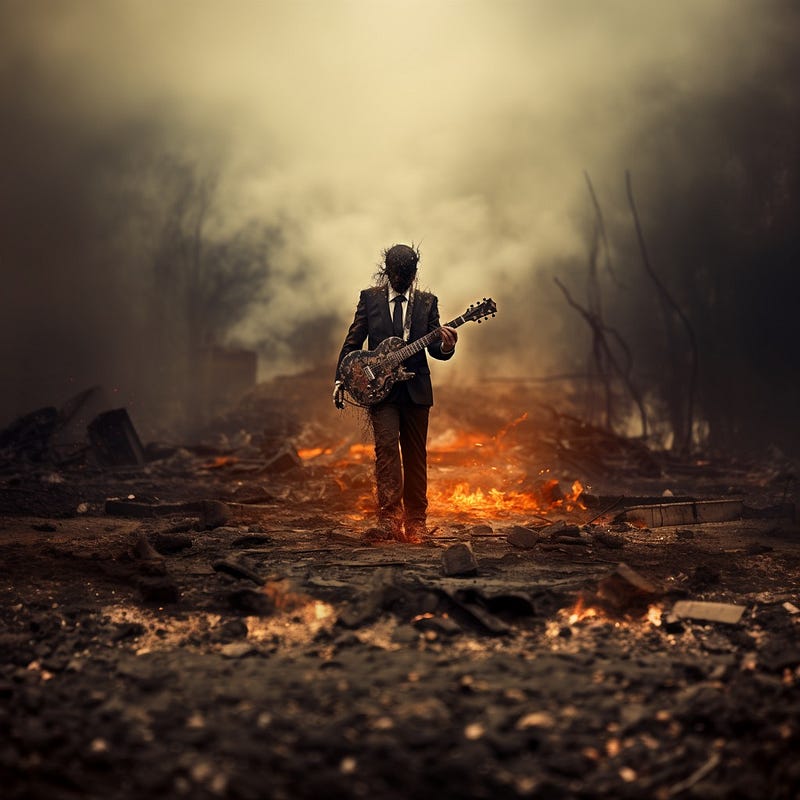How AI Empowered My Journey to Complete a Metal Album
Written on
Chapter 1: Introduction to My Musical Journey
In the realm of music, the rise of generative AI has become a hot topic, with countless creators striving to harness its potential for their own gain. While I’ve indulged in my share of amusing experiments with AI, I often find them losing their charm quickly. The allure of AI lies in its ability to create from scratch, whether it’s coding, web design, or music composition. However, this rapid capability can feel somewhat soulless, reducing creativity to mere "prompt engineering," a term I find rather off-putting.
What truly captivates me are the subtle ways AI can support the creative process rather than overshadow it. In my case, a simple AI tool played a pivotal role in helping me complete my music album.
Prologue: The Motivation Behind My Music
From a young age, I have been passionate about composing music. My experiences in various bands since my teenage years often left me indifferent to rehearsals and live performances, and the recording process has never been my favorite. Despite my enthusiasm for composing, the tediousness of recording, mixing, and mastering has kept much of my work unpublished.
As technology advanced, home recording became more accessible. However, mixing and mastering remained daunting tasks that required a level of expertise I did not possess. My frustration with this reality led me to discover the help I could find in AI.
Chapter 2: Harnessing AI for Music Production
Under the name MELLANCHEF, I create progressive metal music characterized by down-tuned guitars and intricate rhythms. The challenge lies not only in crafting the right guitar tones and drum beats but also in achieving a polished mix.
Here's a glimpse of my home studio setup:
- Logic Pro (Digital Audio Workstation)
- Focusrite Scarlett 2i2 (USB Audio Interface)
- Line 6 Helix LT (Amp and Effects Processor)
- Native Instruments Komplete 14 (Instrument Library)
For this instrumental project, I primarily used:
- Schecter Hellraiser C-8 (Eight-String Guitar)
- Ibanez RG7321 (Seven-String Guitar)
- Ibanez SR505 (Five-String Bass)
All drum tracks were programmed using the One Kit Wonder: Metal plugin from GetGood Drums, while Arturia’s Pigments provided the synth layers.
The Mixing Process
After meticulously crafting my sound, I faced the reality that my mix needed significant refinement. An impatient search for “mixing + AI” led me to iZotope’s Neutron, a software that transformed my approach to mixing.
This tool proved to be a game-changer. The AI assistant analyzes my recordings and generates a tonal balance target curve, guiding me through the mixing process by suggesting adjustments. This automation allowed me to enhance my mix significantly without needing a professional engineer.
AI Album Art is Bad, But What I've Learned About AI Is Even Worse! - YouTube
The Mastering Journey
With a satisfactory mix in hand, the next step was mastering, a process often just as tedious as mixing. I turned to Landr, a cloud-based platform I had used successfully in the past. Its AI mastering tool simplifies the process to just uploading tracks and configuring basic settings.
Landr also allows referencing other tracks to achieve the desired sound profile, making it an invaluable resource for my project.
AI generated Metal is INSANE! - YouTube
The Final Touches
Once my album was complete, I needed to create a cover that encapsulated its themes. Inspired by the album title "Corporate Bullshit," I envisioned a faceless figure in a suit with a guitar amidst a desolate landscape. Using Midjourney, I generated an image that perfectly captured this concept.

With the album ready for distribution, I partnered with the Swedish independent label Amuse to release it on major streaming platforms like Spotify and Apple Music.
Conclusion: The Role of AI in Music Creation
While tools like Neutron and Landr may not possess the flair of more prominent AI applications, they have significantly impacted my ability to complete an album that might have otherwise remained unfinished. Ultimately, AI tools are about enhancing our creative processes, allowing us to realize our artistic visions rather than overshadowing them.